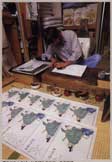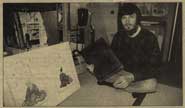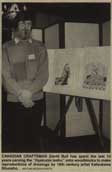Traditional Craft, Crisis or ... ?
As a worker in the field of traditional Japanese crafts, one of the most common things I hear from visitors to my workshop is, "Isn't it a pity that wonderful crafts like this are dying out nowadays." We sometimes tend to view traditional crafts as being superior to modern ways of doing things, but I have to wonder about this. I am sure that the craftsmen of old did not view their work in special terms. I think that they were simply people 'doing a job'. Whether they were potters, straw sandal makers, temple carpenters, or even woodblock printmakers like me, they simply got up each morning, had their breakfast, and started work, just like we do today. They made products needed by their society. But over the course of the years, as times changed, demand for various commodities fell, and that for others rose. The wheel turns - it never stops turning. Various ways of doing things arise, flourish for a time, and then fade away - naturally.
If this is indeed the normal course of events, then we should not really be so concerned with the passing of traditional crafts. We should not cry, "It's such a shame!" when we hear of a master craftsman with no apprentices by his side learning the trade. The young people who could have been his apprentices are all off busy creating new ways of doing things, as young people should. Edo-era crafts cannot possibly have much relevance in a Heisei-era world.
Even as we accept this though, another point of view remains. Think of our musician friends, busy creating modern forms of music: rock, jazz and pop, but also still making room for listening to Mozart. In this case, the modern has not displaced the old, but simply stands beside it. It seems that our society is quite capable of sparing some of its resources for the purpose of preserving these traditions.
But this can only be true for as long as there is an audience for them. If people continue to buy recordings of Mozart's music, traditional musicians will continue to play it, thus preserving the tradition. As long as people choose hand-made dishes for their table, potters will be happy to continue to create them. It comes down to a simple equation: if you value such things, then you must make use of them in your daily life. If you do not, then the wheel will indeed turn full circle, and they will disappear as a matter of course.
The choice is yours to make. It is not we the craftsmen, but you the consumers, who will decide which crafts will survive. We are waiting, our skills ready to be at your service. Our future is in your hands.
TV Listings
The 'Woodblock Shimbun' has a full selection of TV programs on file. Videos available include some of David's news appearances, complete feature programs, and some short documentaries on his work. The files are in QuickTime format, and can be easily viewed with your browser.
Program listings are on the Index page ... ![]()
Enchanting Japan
Colourful woodblock prints - for people all over the world, to hear this phrase is to think of Japan. Japan has a long history of woodblock printing, or hanga, originally for illustrations for books. By the late seventeenth century, hanga in the ukiyo-e style came into its own as an art form, and prints came to be appreciated on their own merits. The many woodblock prints that accurately depict life in the Edo period are excellent examples of this tradition. Whether a print of a geisha, a kabuki actor strutting on stage, or even a completely modern image, the woodblock printing technique seems to provide the perfect means of expression to capture the essence of things Japanese. (1998)
Full Story. ![]()
Japanese Art with a Canadian Touch
A British-born artist from Canada is holding an exhibition of his 60 works of ukiyoe woodblock prints, part of his 10-year project to carve and print the Hyakunin Isshu poem collection. (1998)
Full Story. ![]()
Woodblock Man Carves Niche
Woodblock carver David Bull refuses to be called an 'artist' or 'sensei'. "I'm just the guy who carves a piece of wood," Bull said. "All I do is copy what the real artists did." Since 1989, the Canadian university dropout who once played the flute on the streets of London has spent many hours bent over his woodblocks, nose and beard almost touching the surface, as he carved toward a self-appointed goal: the recreation of 18th century ukiyo-e artist Katsukawa Shunsho's 'Hyakunin Isshu: Poems from One Hundred Poets' series. (1999)
Full Story. ![]()




